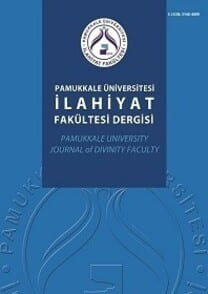Kötülük Problemini Yeniden Konumlandırma: Güncel Bir Tartışmanın Analizi Ve Değerlendirilmesi
Ahlak, Kötülük Problemi, Mantıksal Kötülük Problemi, Tanrı, James Sterba
Relocating the Problem of Evil: Analysis and Evaluation of A Current Discussion
Morality, Problem of Evil,
___
- Adams, Marilyn. Horrendous Evils and the Goodness of God. New York: Cornell University Press, 1999.
- Aristoteles. Politika. çev. Mete Tuncay. İstanbul: Remzi Kitabevi, 1975.
- Attfield, Robin. “Reconciling the God of Traditional Theism with the World’s Evils”. Religions 11/10 (2020), 1-13. https://doi.org/10.3390/rel11100514
- Balci, Elif Nur. “A Modified Free-Will Defense: A Structural and Theistic Free-Will Defense as a Response to James Sterba”. Religions 13/8 (Ağustos 2022), 1-12. https://doi.org/10.3390/rel13080700
- Bergmann Michael. Skeptical Theism and the Problem of Evil. Oxford: Oxford University press, 2009.
- Bishop, John. “On the Significance of Assumptions about Divine Goodness and Divine Ontology for ‘Logical’ Arguments from Evil”. Religions 12/186 (2021), 1-13. https://doi.org/10.3390/rel12030186
- Burns, Elizabeth. “Evil and Divine Power: A Response to James Sterba’s Argument from Evil”. Religions 12/ 442 (2021), 1-13. https://doi.org/ 10.3390/rel12060442
- Chen, Cheryl K. “God and the Playpen: On the Feasibility of Morally Better Worlds”. Religions 12/ 266 (2021), 1-8. https://doi.org/10.3390/ rel12040266
- Davies, Brian. Thomas Aquinas on God and Evil. Oxford: Oxford University Press, 2011.
- Davies, Brian. The Reality of God and the Problem of Evil. London: Continuum, 2006.
- Davies, Brian. An Introduction to the Philosophy of Religion. Oxford: Oxford University Press, 2021.
- Draper, Paul. "The Skeptical Theist." The Evidential Argument From Evil. ed. Daniel H. Snyder. 175-192. Bloomington: Indiana University Press, 1996.
- Dosteoyevski, Fyodor. Karamazov Kardeşler. İstanbul: Türkiye İş Bankası Kültür Yayınları, 2007.
- Feser, Edward. “The Thomistic Dissolution of the Logical Problemof Evil”. Religions 12: 268 (2021),1-17. https://doi.org/10.3390/rel12040268
- Hartshorne, Charles. Omnipotence and Other Theological Mistakes. Albany: State University of New York Press, 1984.
- Hartshorne, Charles. The Divine Relativity. New Haven and London: Yale University Press, 1948.
- Hasker, William. “James Sterba’s New Argument from Evil. Religion”s. 12/ 21 (2021), 1-7. https:// doi.org/10.3390/rel12010021
- Hasker, William. Providence, Evil and the Openness of God. Abingdon: Routledge, 2004.
- Hick John. Evil and the God of Love. New York: Palgrave Macmillan, 2007.
- Huffling, Joseph Brian. “Is God Morally Obligated to Prevent Evil? A Response to James Sterba”. Religions12/ 312 (2021), 1-13. https://doi.org/10.3390/rel12050312
- Hume, David. Din Üstüne. çev. Mete Tunçay. Ankara: İmge Kitabevi Yayınları, 1995.
- Inwagen, Peter Van. “Quam Dilecta”. God and the Philosophers. ed. Thomas V. Morris. 31-60. New York: Oxford University Press, 1994.
- Kutsal Kitap. Erişim 11 Ağustos 2022. https://kutsalkitap.info.tr/?q=rom%203
- Lewis, David. “Evil for Freedom’s Sake?”. Philosophical Papers 22/3 (1993), 149–172.
- Mackie, John. L. "Evil and Omnipotence." Mind 64/254 (April 1955), 200-212.
- Mackie, John L. The Miracle of Theism: Arguments for and against the Existence of God. Oxford: Oxford University Press, 1982.
- Manafov, Rafiz. John Hick’in Din Felsefesinde Kötülük Problemi ve Teodise. İstanbul: İz Yayıncılık, 2007.
- Mizzoni, John. Ethics: The Basics. Second edition, Wiley Blackwell. second edition. 2017.
- Neiman, Susan. Modern Düşüncede Kötülük: Alternatif Bir Felsefe Tarihi. çev. Ayhan Sargüney. İstanbul: Ayrıntı Yayınları, 2006.
- Peterson, Michael L. “Recent Work on the Problem of Evil”. American Philosophical Quarterly 20/4 (1983), 321–39.
- Plantinga, Alvin. God, Freedom, and Evil. Michigan: William B. Eerdmans Publishing Company, 1977.
- Rowe, William. “The Problem of Evil and Some Varieties of Atheism”. American Philosophical Quarterly 16/4 (October 1979) 335–341.
- Salamon, Janusz. “The Sovereignty of Humanity and Social Responsibility for Evil Prevention”. Religions 12/ 418 (2021), 1-16. https://doi.org/ 10.3390/rel12060418
- Sterba, James P. Is a Good God Logically Possible?. Cham: Palgrave Macmillan, 2019.
- Swinburne, Richard. Providence and the Problem of Evil. Oxford: Clarendon Press, 1998.
- Walls, Jerry L. “Heaven and the Goodness of God”. Religions 12: 316 (2021), 1-9. https://doi.org/ 10.3390/rel12050316
- Wilmot, Brett. “God and the Problem of Evil: An Attempt at Reframing the Debate”. Religions 12/ 218 (2021), 1-18. https://doi.org/10.3390/ rel12030218
- Yaran, Cafer Sadık. Kötülük ve Teodise. Ankara: Vadi Yayınları, 1997.
- ISSN: 2148-4899
- Yayın Aralığı: 2
- Başlangıç: 2014
- Yayıncı: PAMUKKALE ÜNİVERSİTESİ
Kötülük Problemini Yeniden Konumlandırma: Güncel Bir Tartışmanın Analizi Ve Değerlendirilmesi
Ahmet Mithat Efendi’nin Dinler Tarihi Kitabı Ve Dersleri Üzerine Bazı Tespitler
İkinci Klasiklerden Bir Hadis Kaynağı: el-Ehâdîsü’l-muhtâra
Yüksek Din Öğretimi Öğrencilerinde Fakülte Memnuniyeti İle Siber Aylaklık Arasındaki İlişki
Memlükler Dönemi (1250-1517) Şairleri
Yabancılaşma Ve Dindarlık Üzerine Bir Araştırma
el-Ḥumeydî’nin Bedî‘iyyesinde Kullandığı Bazı Edebi Sanatlar
Ramazan EGE, Sadullah TİLKİTAŞ
Kısas ve Diyet Cezalarında Kadın ve Erkeğin Birbirine Denkliği Meselesi
